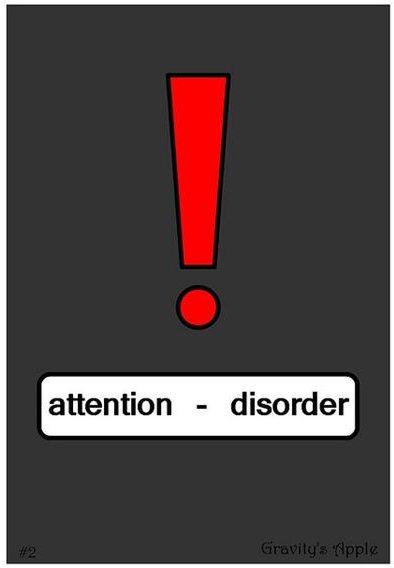What are the ADHD Characteristics in Adults?
Attention Difficulties
The primary ADHD characteristics in adults is the person’s inability to concentrate. Lack of concentration brought about by ADHD impedes the person’s ability to perform and maintain personal relationships.
People suffering from ADHD find themselves in a constant state of distraction, unable to train their thoughts on something specific for long, and unable to complete even simple tasks or projects. This manifests in symptoms such as:
- zoning out without realization, even in the middle of a conversation
- inability to pay attention when reading or listening to others
- inability to remember the details of conversations or follow directions
- making many careless mistakes or errors at work
- leaving work incomplete
- trouble staying motivated in anything for long
While many of these characteristics of ADHD in adults are normal human behaviors, people with ADHD experience one or more of these more severely.
Image Credit: flickr.com/Sean McMahon
Hyper-focus
At times, people suffering from ADHD become very much absorbed in tasks they find stimulating and rewarding, to the extent of remaining oblivious to everything else around them. Although such hyper-focus when channeled into productive activities can benefit the individual, very often it leads to work and relationship problems, with the individual neglecting to perform even the basic duties or chores.
Disorganization
People suffering from ADHD usually remain disorganized, unable to sort out the information they need to regulate their life or stick to a routine. Such people find it difficult to set priorities, manage time, or keep track of things to do.
ADHD induced disorganization and forgetfulness leads to:
- living with clutter and messy home, office, desk, or car
- procrastination, and difficulty in starting, pacing, and finishing projects
- frequently forgetting appointments, commitments, and deadlines
- always remaining late and running against the clock
- poor time management and inability to prioritize
- constantly losing or misplacing things such as keys, wallet, phone, documents, bills
Restlessness and Hyperactivity
People with ADHD very often experience restlessness and hyperactivity that affects the person’s ability to rest, relax, work, and sleep properly, and therefore can cause serious damage to the person’s mental and physical health. The external symptoms of hyperactivity are usually the same in adults and children; in addition adults with ADHD experience inner restlessness.
Common symptoms of hyperactivity in adults include:
- feelings of agitation and inner restlessness
- trouble sitting still, with constant fidgeting, bouncing legs, and jittery hands
- tendency to pace the floor
- getting bored easily
- excessive and constant craving for excitement
- excessive talking
- tendency to do many things at once
Impulsiveness
Another major characteristic of adult ADHD is impulsiveness, which entails acting without thinking or reacting without considering the consequences. People suffering from ADHD usually have poor self-control, and cannot inhibit behaviors, comments, and responses.
An adult ADHD symptom checklist related to impulsiveness include:
- frequently interrupting others or talking over them
- blurting out rude or inappropriate thoughts without thinking or considering the occasion
- behaving in ways not considered socially appropriate, and engaging in promiscuity or indulgent behavior
- rushing through tasks without reading instructions
- switching tasks frequently, and going to another task before completing one task
- overeating or excessive drinking
- acting recklessly or spontaneously without regard of consequences
- displaying impatience
The extent of ADHD induced impulsivity may be minor such as talking before thinking, interrupting conversation, or impatience. Or it can be major, such as abruptly starting or stopping relationships, shoplifting or other antisocial behavior, and excessive involvement in shopping sprees or other pleasurable activities without regards to the consequences.
Emotional Characteristics
Many adults with ADHD experience difficulty managing their emotions such as anger or frustration. They experience depression, confusion, uncertainty, anxiety, or anger, causing them to over react or react inappropriately to ordinary stresses or frustrations. They remain short-tempered, hypersensitive to criticism, easily provoked or irritated, and experience wild mood swings.
They frequently experience a sense of underachievement, and have low self-esteem and a sense of insecurity.
References
- United Cerebral Palsy. “Definitions.” https://www.ucp.org/ucp_generalsub.cfm/1/9/36. Retrieved 12 November 2010.
- American Academy of Family Physicians. “ADHD in Adults.”. https://familydoctor.org/online/famdocen/home/common/mentalhealth/kids/636.html. Retrieved 12 November 2010
- Emedicinehealth. “ADHD in Adults.” https://www.emedicinehealth.com/adhd_in_adults/page1_em.htm. Retrieved 12 November 2010
- Helpguide.org. “Adult ADD / ADHD.” https://www.helpguide.org/mental/adhd_add_adult_symptoms.htm. Retrieved 12 November 2010.
